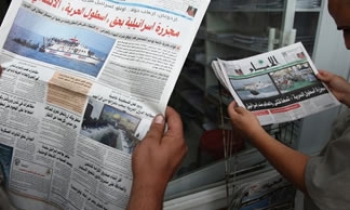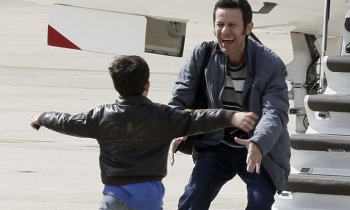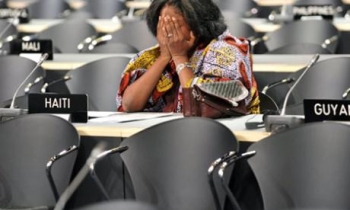The Israel-Hezbollah conflict has claimed its first journalist. Layal Nejib, a photographer working for a Lebanese magazine was killed Sunday when her taxi was hit by a shrapnel as Israeli warplanes bombarded a convoy of people feeling their homes near Tyre in southern Lebanon. Nejib, 23, is the first journalist to be killed in Israel's offensive to push back Hezbollah guerrillas who captured two Israeli soldiers and killed eight others on July 12, Lebanese security officials said.

Lebanese Red Cross ambulances were on the road with the group of 70 people fleeing Tairi, a village in the heart of the war zone at the border the Israeli military had ordered to be evacuated a day earlier. The convoy was heading to the port of Tyre on the Mediterranean coast and was seven miles from the city when missiles hit the minibus, Three people in the van were killed and 16 others wounded, Associated Press (AP) reported. The ambulances rushed the wounded to hospitals in Tyre.
Nejib, who worked as a photographer for Lebanese weekly Al-Jaras, was racing to cover the flight of the villagers. Nejib's taxi was hit by shrapnels, and she was seriously injured. She died on the spot, the officials said, speaking on condition of anonymity because they were not authorised to speak to the press. Her driver survived, they said.
"The tragic death of this young journalist illustrates once again the priority that must be given to protecting media staff covering armed conflicts," said International Federation of Journalists (IFJ) General Secretary Aidan White. "This conflict is daily becoming more dangerous for media staff. Again we appeal to all sides to recognise that journalists are non-combatants who must be allowed to do their jobs safely without fear of being targeted."
"We are appalled that the Israeli army is taking so few precautions to avoid civilian deaths or casualties, especially among the media," Reporters sans Frontières (RSF) said in a statement of condemnation. "We demand that the Israel government investigate the shooting that killed Nejib. We will not be satisfied by the army's standard response that the targets were military ones linked to Hezbollah."

The first journalist casualty came the same day (July 23) as IFJ condemned Israeli air raids the previous day that hit transmission stations used by several Lebanese television channels and the reported killing of Suleiman Chidiac, a technician working for the Lebanese Broadcasting Corporation.
IFJ's statement, in turn, came in the aftermath of the Israel Association of Journalists deciding on July 20 to suspend its membership from IFJ to protest the association's earlier condemnation of Israel's attacks on Hezbollah's Al-Manar television network.
Al-Manar, which is linked to Hezbollah, the political group whose armed wing is involved in violent attacks against Israel, is a controversial network whose broadcasts have been banned by some countries in the West, notably France.
On Saturday, two others were wounded in the strikes when relay stations for Future TV, Hezbollah-run Al-Manar television and the nation's leading private network, Lebanese Broadcasting Corporation, were attacked by Israeli bombs.
"These attacks once again put media in the front line of the conflict," said Aidan White, IFJ General Secretary. "They represent an appalling threat to press freedom and to the safety of media staff and cannot be justified." IFJ said that the attacks broaden Israel's assault on media beyond Al-Manar television which was attacked last week.

The strike against Lebanese Broadcasting Corporation underlined the federation's concern about targeting, which it said was dangerous but ineffective in stifling media. Al-Manar reportedly only went off the air for less than 10 minutes during the pounding.
"The bombarding of media facilities is a deplorable assault on the democratic infrastructure of Lebanon," said White. "It is inevitable that media staff will become the victims when this policy comes into effect. Once media are attacked with impunity, journalists on all sides are at risk. We insist that journalists and unarmed media be regarded at all times as non-combatants and must not be attacked by military forces."
The International News Safety Institute (INSI) had on July 19 appealed to all sides to respect the safety and security of journalists and other news media staff. "Journalists of all persuasions representing news organisations of every stripe are covering the fighting in Lebanon, Gaza and Israel. They have a dangerous and difficult job to do and their safety and independence must be honoured," said INSI Director Rodney Pinder. "All parties to the conflict should remember that without free and open reporting not only the outside world but they themselves will be blinded," he said.
The Geneva Conventions demand respect for human beings in time of armed conflict, and that includes respect for the human rights of journalists, who are classified as civilians entitled to protection from violence, threats, murder, imprisonment and torture. These legally binding treaties date from 1949 and have been ratified or acceded to by most countries. They form part of international humanitarian law. Violation makes a soldier or militia member guilty of a war crime, Pinder said.

Meanwhile, Israeli journalists accused White of "cowardice" for not retracting the organisation's July 14 condemnation of Israel and said White deserved a "badge of shame" for calling the Hezbollah propaganda tool "free press." Israel Radio broadcaster Yaron Anosh, Israeli representative on the IFJ executive, contended, "Al-Manar gets its budget from the same people firing upon us. They are not journalists, they are terrorists and I won't be a member of the same organisation as terrorists."
Anosh told the Jerusalem Post that IFJ's defence of Al-Manar was the straw that broke the camel's back after three years of repeated IFJ condemnations of Israel. He said the organisation made no comment when five Israeli and foreign journalists were harmed by Hezbollah fire. "I have no intention of being a card-carrying member of an organization that would give a similar card to a Hezbollah member, whether he is firing a Katyusha or serving as the group's propaganda officer at its TV station," Anosh was quoted by Haaretz as saying. "A terrorist is not a journalist, and if an international organization prefers to have terrorists as members - then count us out."
IFJ had on July 14 said that Israel's attack on Al-Manar's Beirut headquarters last week followed a pattern of media targeting that threatened the lives of media staff, violated international law and endorsed the use of violence to stifle dissident media.
"The bombing of Al-Manar is a clear demonstration that Israel has a policy of using violence to silence media it does not agree with," White asserted, and came down heavily on Israel saying, "This action means media can become routine targets in every conflict. It is a strategy that spells catastrophe for press freedom and should never be endorsed by a government that calls itself democratic."

Israel asked for a retraction of the condemnation, but IFJ issued another statement on July 17 after Reuters cameraman Rami Amichai was wounded in the leg by shrapnel in a Hezbollah rocket attack while filming in an Israeli coastal city. IFJ rejected claims that its criticism of Israeli attacks on Al-Manar in Beirut was "taking sides" in the region's conflict. "We do not endorse or support the views of any particular media organisation, but we do insist that all media should be treated as non-combatants," said White.
IFJ that day also called on Israel to release Walid Al Omari, Al-Jazeera Bureau Chief who was being held without explanation after he and his colleague were detained on July 16. The Palestine Journalists Syndicate, an IFJ affiliate, reported that authorities were obstructing Al-Jazeera crews from covering the confrontation in Lebanon from northern Israel. Al-Jazeera correspondent, Ilyas Karram was held for a time just as a wave of Hezbollah missiles hit Haifa. "The obstruction, intimidation and violence against media make it impossible for journalists to work safely and freely," said White.









